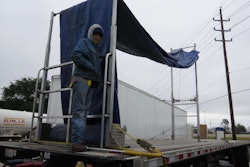 Owner-operator Jimmy Lessley
Owner-operator Jimmy LessleyNew Jersey’s legislature is one of at least five state assemblies considering changes in employee and contractor classification.
On March 14, the state assembly transportation committee reported favorably on the Truck Operator Independent Contractor Act. The bill, A1578, is opposed by the Owner-Operator Independent Driver Association. An identical bill, S1450, also was introduced in the state’s senate.
The bills stipulate the state’s labor department consider port drayage and parcel delivery drivers employees instead of contractors, unless the service receiver can overcome legal presumption of employment. Non-employee status would include requiring that service provided is outside the usual course of the business for which the service is performed or the service is performed outside of all of the payor’s business locations.
The committee amended the bill to apply this reclassification to the state workers’ compensation law. However, the provisions regarding misclassification would not be applicable to the prevailing wage law.
Civil penalties would apply and if misclassification is committed knowingly, criminal penalties as well. If the violator underpaid employees because of misclassification, then criminal fines and restitution to victims could apply. Administrative penalties may also be assessed to $2,500 for a first violation and up to $5,000 for each subsequent violation.

Conversely, Connecticut is considering an exception in the workers’ compensation status. It would apply to owner-operators of trucks weighing 10,000 pounds or more and who transport property, even in part, in interstate commerce. On March 19, HB6151 was filed the Legislative Commissioner’s Office after its introduction Jan. 25.
.Other states considering bills addressing employee misclassification:
- The Washington Trucking Association opposes HB 1440, a bill to prohibit misclassification and creating a new test to determine if someone is an independent contractor. It was referred to the rules committee March for a second reading.
- Kentucky’s House labor committee received SB 89 Feb. 25, following passage by the Senate. It creates definitions of contractor and subcontractor, would require the state revenue department write criteria to establish contractor status and sets penalties for violators.
- Nevada’s SB95 establishes an employee misclassification task force. SB96 allows fining employers up to $25,000 per offense for misclassifying workers as contractors and suspension of their business license for up to 3 years. Both were referred to committee last month.










